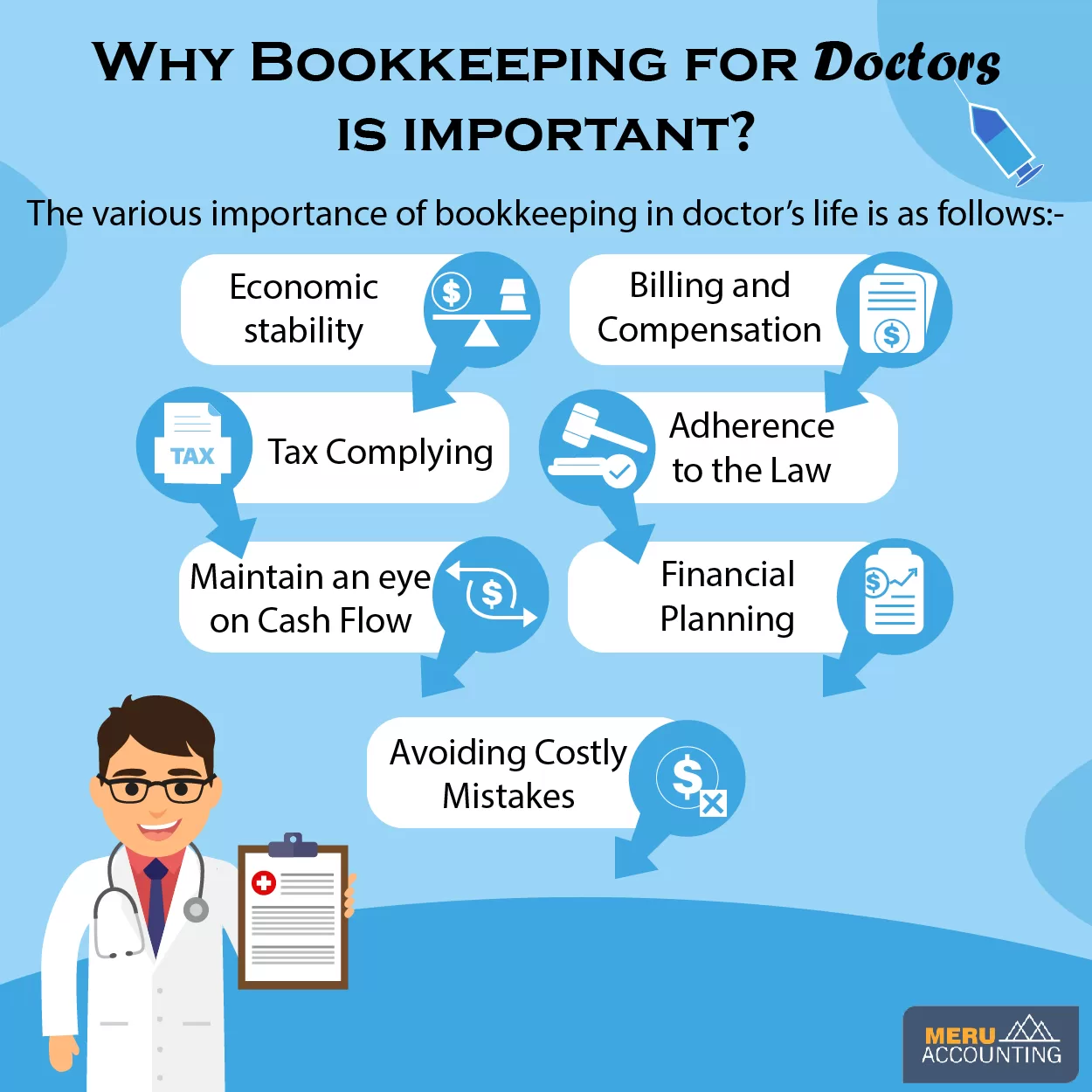Home » Why Bookkeeping for Doctors is important?
Why Bookkeeping for Doctors is important?
In the public’s eye, doctors are frequently seen wearing white coats, listening intently to their patients with stethoscopes around their necks. While this is undoubtedly the case, bookkeeping and accounting represent another aspect of a doctor’s job that is just as important yet frequently ignored. For doctors and their medical practices in the US, maintaining thorough financial records like bookkeeping is crucial.
Let’s discuss why bookkeeping for doctors is important:-
1. Economic stability
The financial stability of a medical practice is crucial, much as our physical health. Medical professionals must pay their personnel, purchase and maintain equipment, and deal with a variety of overhead expenses.
It’s difficult to efficiently manage these costs and make sure the firm maintains its financial stability without good bookkeeping for doctors.
Doctors who keep accurate financial records can better understand their spending patterns and choose effective cost-saving measures.
2. Tax Complying
In the USA, doctors, like all other professionals, must pay taxes. The doctor bookkeeping maintains accurate books in order to make sure they pay the appropriate amount of taxes.
Financial record errors or discrepancies can result in tax audits, fines, and even legal problems.
A sound doctor bookkeeping system makes sure that all revenue and expenditures are accurately recorded, which makes tax time considerably less stressful and lowers the possibility of mistakes.
3. Maintain an eye on Cash Flow
Any business, including medical offices, depends on cash flow. To pay for daily expenses and make investments in the expansion of their practice, doctors while preparing bookkeeping for doctors must maintain a consistent cash flow.
Doctors can spot periods of high and low cash flow by using bookkeeping to track money’s inflow and outflow.
With the use of this knowledge, they can take proactive steps to manage their finances well, such modifying their invoicing procedures or cutting back on pointless spending.
4. Billing and Compensation
Doctors must bill patients, insurance companies, and government programs for the medical services they deliver. To effectively track these transactions, accurate bookkeeping is necessary.
The bookkeeping for doctors guarantees that bills are sent out right away and that refunds are received right away.
5. Adherence to the Law
Doctors must abide by several federal and state rules because the healthcare sector is highly regulated. Doctors can comply with these regulatory obligations by keeping accurate books.
It enables the accurate recording of patient information, healthcare costs, and adherence to regulatory requirements. A medical practice’s reputation could be put at risk and legal issues could arise from failing to keep such data.
6. Financial Planning
Like everyone else, doctor bookkeeping have financial aspirations for their personal and professional lives. They might desire to increase their clientele, put money aside for retirement, or buy new medical supplies.
In order to develop and carry out a thorough financial plan, bookkeeping offers the required financial data.
7. Avoiding Costly Mistakes
Financial management errors can cost doctors a lot of money. These mistakes may result in monetary losses, needless expenditures, or lost revenue potential. The likelihood of these expensive errors is decreased by having an accounting system in place.
For assistance with the development and expansion of your company from skilled bookkeepers and accountants, contact Meru Accounting, a CPA firm that not only provides certified bookkeepers but also a variety of other bookkeeping services.
FAQs
- Why do doctors need bookkeeping for financial stability?
It helps track spending, manage costs, and keep the practice stable through clear records. - How does bookkeeping help doctors meet tax rules?
It keeps income and expense records clean, so tax filing is correct and on time. - What does bookkeeping do for a doctor’s cash flow?
It shows when money comes in and goes out, helping plan for gaps or changes. - How does billing benefit from good bookkeeping in clinics?
It keeps billing clear, tracks payments, and reduces delays from patients or insurers. - Why is accurate bookkeeping needed for legal compliance?
It helps meet rules for cost records, patient data, and practice audits. - What role does bookkeeping play in a doctor’s long-term planning?
It gives numbers doctors can use to plan growth, savings, or new tools. - How does poor bookkeeping lead to costly mistakes?
Missed entries or wrong figures can cause lost income or extra spending. - Why should doctors focus on bookkeeping, not just patient care?
It supports the practice’s health by keeping finances clear and errors low.



